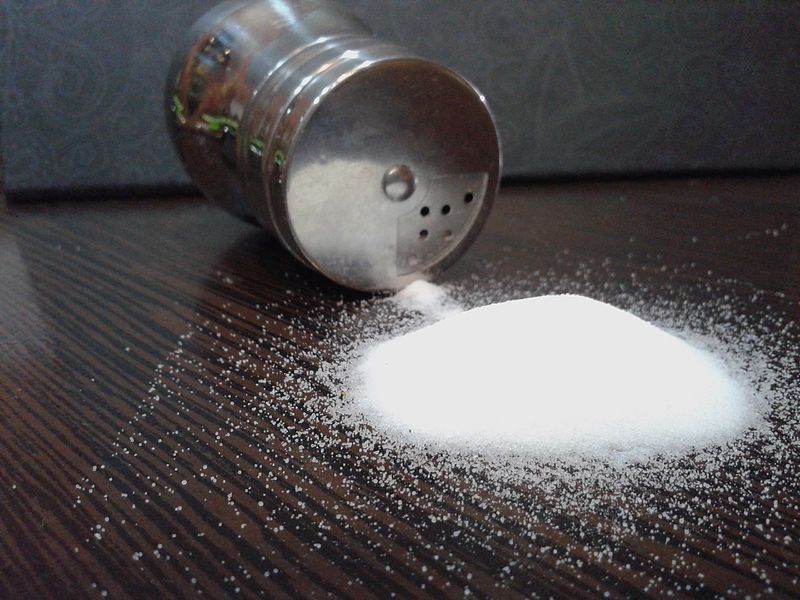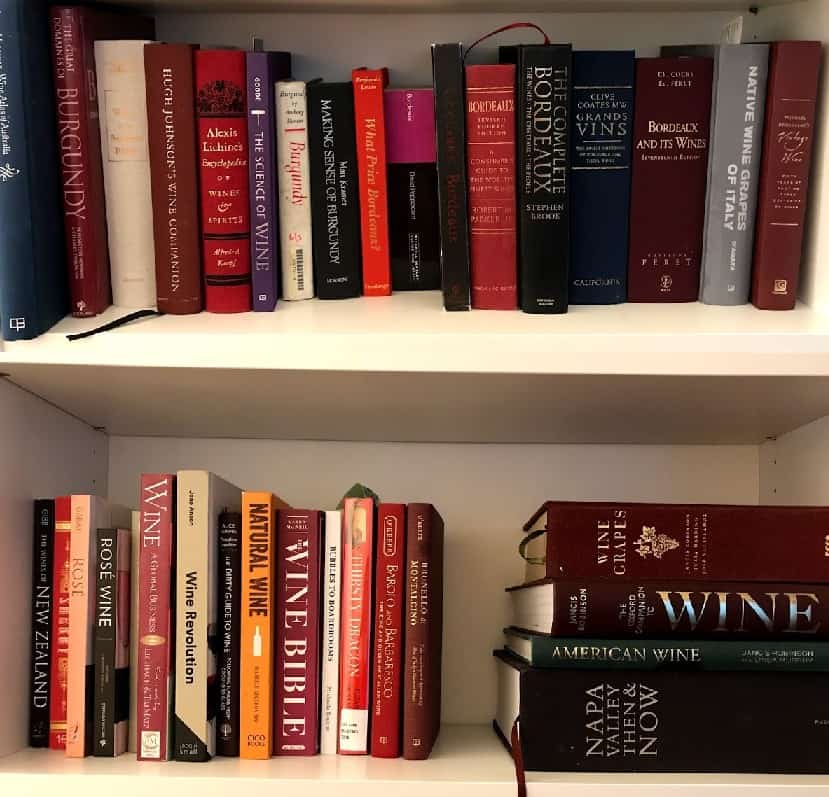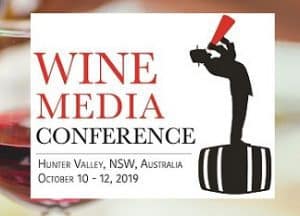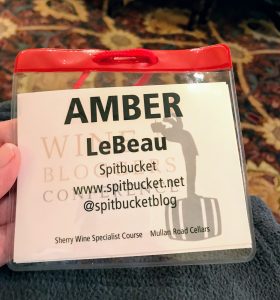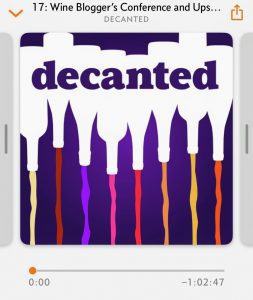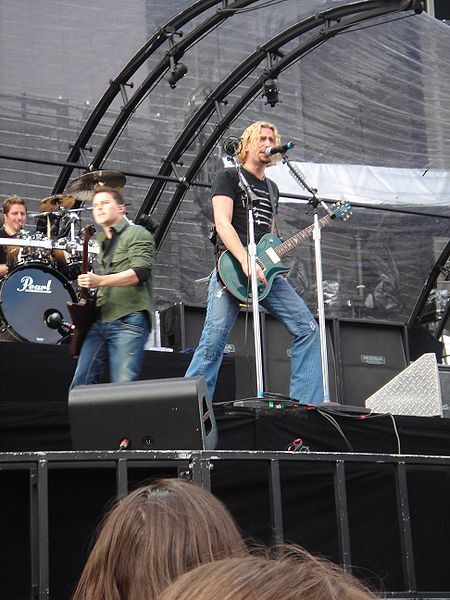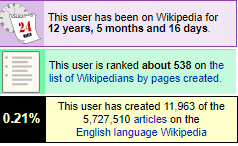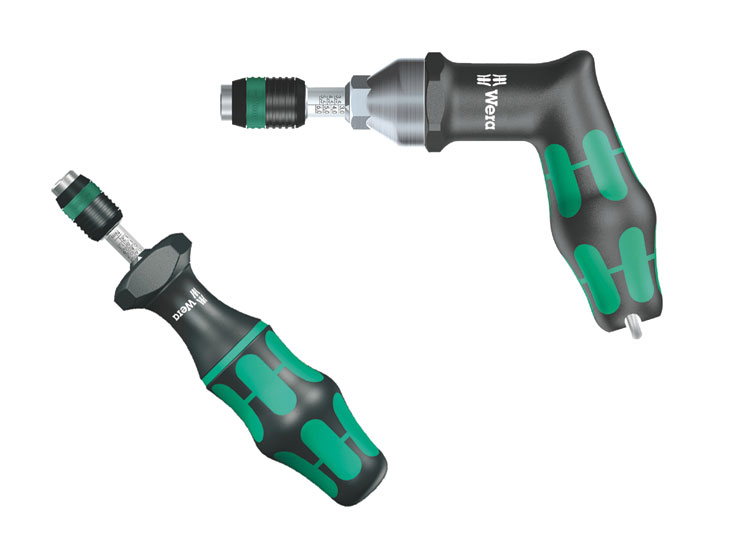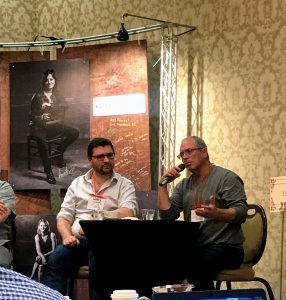
Tom Wark (right speaking) of Fermentation Wine Blog and James Forsyth of Vinous/Delectable
Update: Check out my post Exploring the Cascade Valley at WBC18 about the wines featured at the lunch this day as well as my Day 3 overview for more details about the conference.
I’m darting away from the 2018 Wine Bloggers Conference activities to jot down a few quick thoughts from yesterday’s events. To see my thoughts from Day 1 check out my post here as well as my pre-conference worryfest here.
While a lot of those fears ended up unfounded, Day 2 introduced quite a few meaty questions for me to gnaw on.
It seems like an unofficial theme for Day 2 was “Why Are You Blogging?” with the morning panel and keynote speaker prompting a lot of inward reflection. I will admit that this is a question that has been wrangling around my head for a while now and will probably be the source of much rumination on the long drive home tomorrow.
Wine Bloggers vs Wine Influencers (vs The World)
This panel, moderated by Thaddeus Buggs of The Minority Wine Report, featured James Forsyth of Vinous/Delectable, Michael Wangbickler of Balzac Communications and Tom Wark of the Fermentation Wine Blog.
The aim of the panel was to distinguish what may separate a blogger from an influencer as well as how the future of social media and niche apps like Delectable could impact both.
I may write up a fuller review of this panel but there were three big takeaways that I got that really caught my attention.
1.) From Michael Wangbickler
Social media isn’t an alternative to blogging but it is another channel. While its ideal to utilize multiple channels, some are more tailored to certain audiences than others. For instance, Instagram seems to appeal more to image driven and younger generations while Facebook tends to cater to more lifestyle driven and older audiences. Twitter appeals to a diverse demographic that prefers one on one interactions.
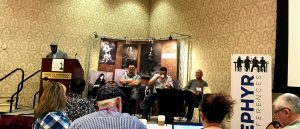
Thaddeus Buggs (far left) of the Minority Wine Report and Michael Wangbickler of Balzac Communication (left seated).
Questions for me to explore:
Who is my audience? This is something I will definitely be pondering more. I think I can eliminate the image driven side. I personally don’t view wine as an “image accessory” nor do I write like it is. To me, wine is about enjoyment rather than enhancing status or image.
I feel like my style caters more towards the wine student and general enthusiasts but who knows? Maybe you guys can help me with some thoughts in the comments.
2.) From Tom Wark
If you are going to blog then you should focus on something that you can be the champion of and commit to posting at least once a week, if not more. Don’t be a generalist. Be the go-to person for something.
Questions for me to explore:
What do I want to champion? Or maybe to put it another way, what drives my passion that can fuel a commitment to write steadily about a topic? This is a dozy for me to chomp on because I can’t really say that I have had a focus with this blog at all. I’ve definitely followed more the generalist approach, writing about whatever has tickled my fancy at a particular moment–even dipping my toes into the world of spirits and beer occasionally.
Do I need to hunker down and focus on something? What can I possible be the “go-to person” for? My initial instinct is to focus more on the wine student aspect and write about the info that I have been seeking out for my studies. In some ways that has always been an impetus for me in writing. Wine info is scattered across the internet and books and I initially started writing wine articles for Wikipedia as a way to consolidate and digest that info into one source.
Do I continue that path with things like my Keeping Up With The Joneses of Burgundy series, Bordeaux Futures and expanded research articles on figures like Martin Ray, Bob Betz, W.B. Bridgman, etc?
3.) From James Forysth
Niche apps like Delectable are ways that writers can build credibility and authority with publishing their reviews as well as get useful backlinks.
Questions for me to explore:
Eh? Reviews are something that will probably always have me conflicted. To be 100% brutally honest, I really don’t think anyone should give a flying flip about what I think about a wine. This is also why the idea of being “an influencer” never appealed to me. If you read my review and go out and buy a bottle of wine, you are spending your money and you will be the one drinking the bottle–so really only your opinion should matter.
This is why I very deliberately organize my reviews to have my opinion shoved down to the bottom. For me, the story of the wine and whatever cool or unique details I discover are far more important.
I will share my opinion on the relative value of the wine versus its cost only because I’ve spent probably way too much money on wine and have learned a few lessons the hard way. I say “relative value” because ultimately we each have to decide on our own if a wine is worth paying what the asking price is–like $2600+ for a bottle of Petrus. That’s a decision that I can never make for you–nor should you ever want me to.
The Wines of Rías Baixas
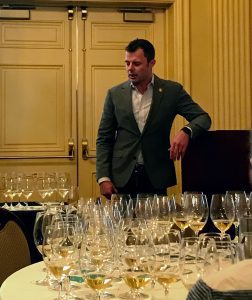
Master Sommelier Chris Tanghe
I was looking forward to this event moderated by Master Sommelier Chris Tanghe. Since I’ve joined the Somm Select Blind 6 subscription, Albarino has been a royal pain in the rear for me to pick out blind. I confuse it so often with several different wines–Oregon Pinot gris, California Viognier, Argentine Torrontes–that I haven’t honed in yet on what’s my blind spot with this variety.
My Albarino issue is probably fodder for a future post but, after trying 8 vastly different examples of the variety from the Spanish wine region of Rías Baixas, I now have at least one razor sharp tell-tale of the variety to look for.
Salinity.
Every single one has this very precise and vivid streak of salinity–even the examples that had a lot of oak influence. While the highly floral and perfume examples will still probably steer me towards Torrontes while the weightier examples will trip up me thinking about Pinot gris or Viognier depending on the fruit profiles, it may ultimately be the salt that leads me home.
Keynote Speaker — Lewis Perdue
Lewis Perdue has a long history in journalism and the wine industry–working for the Washington Post and founding Wine Business Monthly. He currently manages the website Wine Industry Insights which is most prominently known for its daily email News Fetch that is curated by Perdue and Becca Yeamans-Irwin (The Academic Wino).
The bulk of Perdue’s very excellent keynote was about the importance of bloggers building and maintaining trust with their audience. He made the very salient point that admist all the noise of traditional and digital media, ultimately the readers are buying into you and you have to demonstrate that you are worth their time and attention. A big part of that worth is your credibility.
From here Perdue highlighted several pratfalls that befall bloggers who seek out paid promotion opportunities from wineries (are they being upfront with their readers and the Federal Trade Commission?) and noted that the more “the sell” increases in your writings, the less credible you are.
Ultimately each blogger has to answer the question “Why are you blogging?” Are you trying to make money? Trying to inform? Trying to build a reputation?
So….why am I blogging?
I know I’ve very fortunate in that I don’t have to try and scrape together a living from blogging. My wife is a manager in the tech field which safely covers all our bills (especially the wine bills). Listening to Perdue’s keynote as well as comments from the panel earlier and the seminars I took on Day 3 of the Wine Bloggers Conference has only solidified in my mind that I really don’t want to bother at all with influencing/paid promotion junk.
Which probably takes my blog off of a lot of PR and wineries’ radars but oh well. If your winery is really interesting and doing cool stuff like Tablas Creek or Domaine Henri Gouges, I’ll probably find you eventually and be glad to spend my own money on your product.
I know that if it lives up to the hype, I’m going to have a heck of a lot more fun writing about it and telling others than if a winery came knocking on my digital door wanting me to tout some mass-produced Cabernet and Chardonnay.
Frankly if you ever see me writing multiple posts about some bulk brand, dear readers, don’t go and buy the wine. That’s my distress signal. I’ve been kidnap. Send help.
But back to Perdue’s question.
Why am I blogging? I suppose it is to build a reputation and establish credibility. I’ve always been a big believer in the mantra “Show, don’t tell.”
Yes, I’m working on my various certifications and I would like to someday be a Master of Wine but I really don’t want my credibility to rest on some initials. I’d rather get out there into the world and prove my mettle by letting my work speak for itself.
Credibility is extremely important to me which is why I’m an obsessive fact checker and like to litter my posts with frequent links and attributions to other worthwhile sources (something that gets Perdue’s seal of approval). I want to get it right and if I have it wrong, I want to learn where I erred so I can be better the next time.
Live Red Wine Blogging
This was crazy chaotic and I need to hurry up and wrap up this post so I can get to the next round for Whites & Rosé. While I tweeted and Instagram about a few things, the wines that are really worth a more in-depth review I will seek out bottles to purchase for a later post.
Out of the 10 wines I tried, the ones that I will definitely be seeking out are:
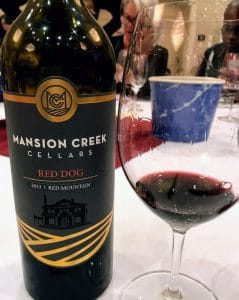
In fact, I already bought a bottle! Kind of made it easy with the Mansion Creek tasting room in the Marcus Whitman hotel.
Mansion Creek Cellars 2015 Red Dog — 70% Tinta Cão (hence the name), 28% Cabernet Sauvignon and 2% Grenache-Syrah. Super cool blend and great back story with the Iberian grape varieties.
Stone Hill 2015 Chambourcin — This wine made this Missouri girl super nostalgic but also super impressed. It was fairly early in the tasting event and I was spitting so I can’t blame palate fatigue but I don’t remember Missouri Chambourcin being this tasty.
Tertulia Cellars 2014 The Great Schism — This winery thoroughly impressed me at this past February’s tasting of the Walla Walla Valley Wine Alliance in Seattle. They poured the 2013 release of the Great Schism which ended up being my wine of the event and this 2014 was just as good. If you are a fan of savory and complex Rhones then this winery needs to be on your radar.
Mystery Wine Country Excursion — L’Ecole 41 and Woodward Canyon
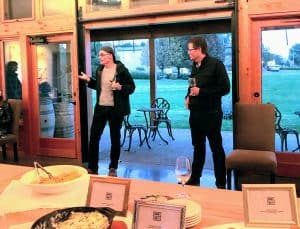
Rick Small (left) of Woodward Canyon and Marty Chubb (right) of L’Ecole
I pulled the red ticket and boy did I score with my mystery location being jointly hosted by the crème de la crème of Washington wine. I can’t do the evening justice in a short blurb so I will save my thoughts for a future post.
But I will say that this event was the perfect fulfillment of my original expectation from my pre-conference post of wanting to hear other opinions from non-Washington bloggers about our local wines.
I really enjoyed listening to the perspectives of Las Vegas-based blogger Louisa from The Grape Geeks and Dallas-based Diane and Nathan Roberts of Positive Vines as they enjoyed these benchmark Washington wines.
I eagerly look forward to reading their write-up of the event (as well as Earle Dutton of Equality 365 who was my dining companion) and comparing notes.
